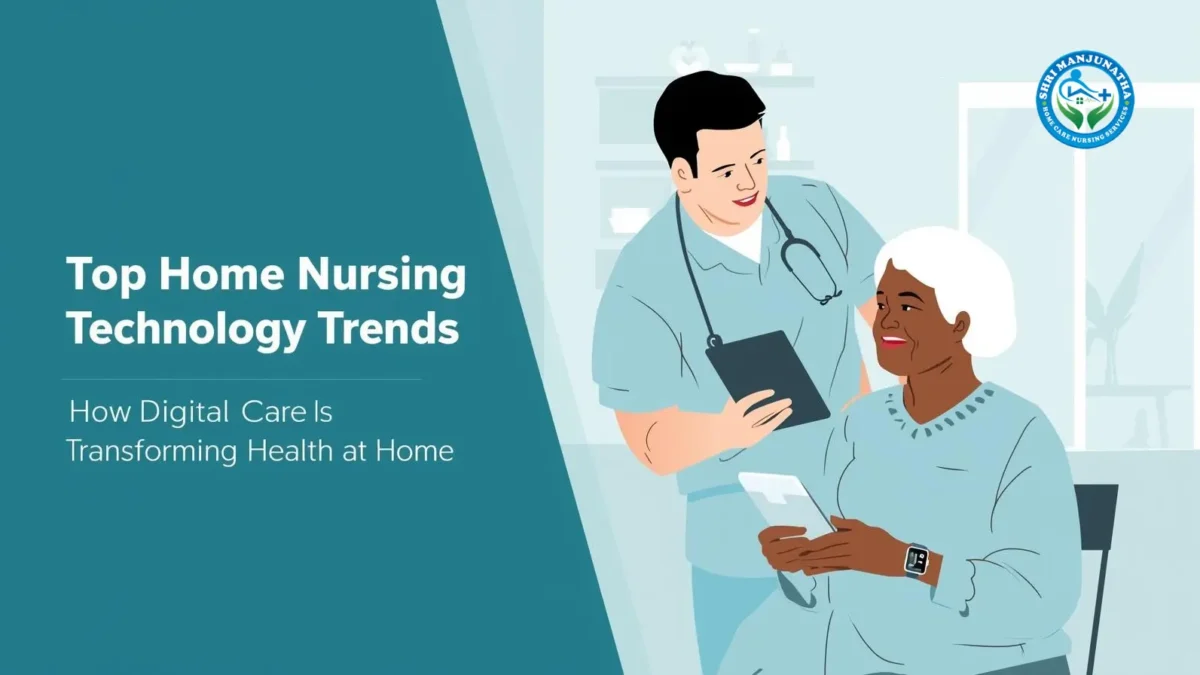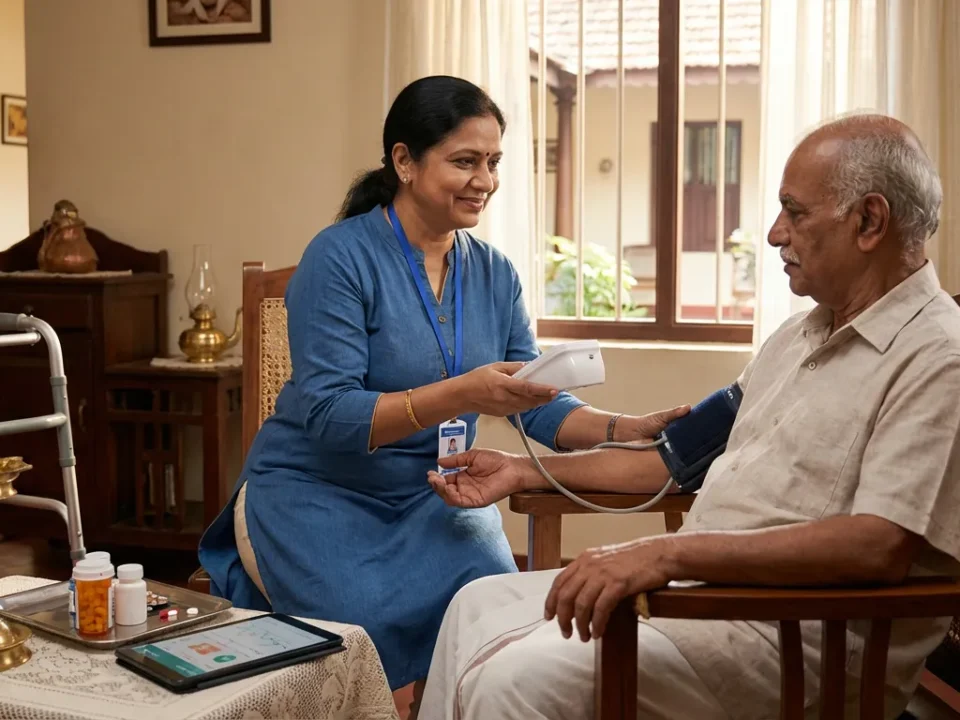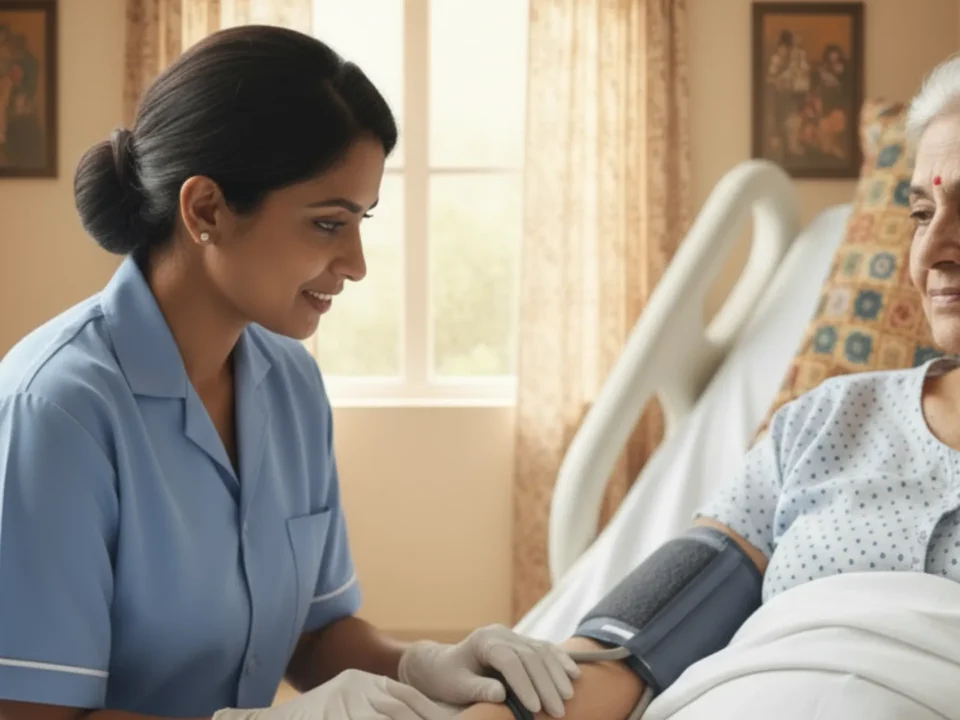Top Home Nursing Technology Trends 2026 | Shri Manjunatha

Importance of 24/7 Nursing Care for Critical Patients
September 17, 2025
Elderly Home Care Services in Mangalore | Trusted Senior Nursing at Home
October 20, 2025How Digital Care Is Transforming Health at Home?
In 2025, the world of home nursing is being reshaped by digital innovation. From AI-assisted monitoring to wearable sensors and virtual care platforms, technology is making it easier for patients to heal safely within the comfort of their homes.
For families across Mangalore, Udupi, and Karnataka, this means better care, faster response, and more peace of mind. In this blog, we’ll explore the top technology trends in home nursing for 2025 — and how Shri Manjunatha Home Nursing is bringing these innovations to your doorstep.
Key Takeaways
• Remote monitoring, AI, and IoMT are redefining home nursing in 2025.
• Digital tools boost nurse efficiency and patient safety at home.
• Shri Manjunatha Home Nursing is pioneering tech-enabled care in Karnataka.
• The future of healthcare is not hospital vs home — it’s human + digital together.
Why Digital Care Is the Future of Home Nursing?
1. Rapid Growth of Home Healthcare
The Indian home healthcare market is projected to grow by over 19% CAGR through 2025. Patients increasingly choose home nursing for comfort, safety, and continuity of care.
2. Rising Demand for Personalized Care
Digital tools allow care plans to be tailored to individual patients — monitoring their unique vitals, habits, and treatment progress.
3. Empowered Nurses and Families
Technology doesn’t replace nurses — it empowers them with data, alerts, and communication channels that make care more efficient and precise.
Top Home Nursing Technology Trends in 2025
1. Remote Patient Monitoring (RPM) and Wearables
Continuous tracking of blood pressure, oxygen, ECG, and glucose levels from home.
Smart patches and wristbands send alerts to nurses when vitals cross thresholds.
Reduces unnecessary hospital visits for chronic or bedridden patients.
2. Telehealth and Hybrid Nursing Models
Virtual consultations save time and reduce infection risk.
Hybrid models combine digital follow-ups with periodic in-person visits.
Ideal for post-surgery care and rural patients with limited hospital access.
3. AI and Predictive Analytics
AI systems analyze vital sign patterns to predict complications early.
Chatbots assist with documentation and appointment reminders.
Predictive alerts help nurses prioritize care and reduce human error.
4. Internet of Medical Things (IoMT) & Smart Home Integration
Devices like smart beds, fall detectors, and IoT thermometers share data in real time.
Homes become responsive — lighting adjusts for sleep cycles, AC for temperature comfort.
Improves safety for seniors and bedridden patients.
5. Non-Wearable Vital Sensing
WiFi-based and infrared monitoring detects movement and breathing without wearables.
Great for patients who can’t tolerate wristbands or skin sensors.
Low-maintenance and cost-effective for long-term care.
6. Robotics and Virtual Assistants
Assistive robots help lift patients, deliver medicine, or remind about hydration.
Voice-based companions offer mental support and detect stress through speech.
Improves mobility and companionship for elderly patients.
Challenges and Best Practices for Implementing Digital Home Care
Infrastructure & Training
Internet connectivity can limit real-time monitoring.
Nurses need training on device handling and software updates.
Data Security & Privacy
End-to-end encryption is a must to protect patient data.
Transparent consent and ethical use of AI analytics build trust.
Cost & Adoption
Start small with affordable RPM kits and scale gradually.
Evaluate ROI through reduced hospital readmissions and better outcomes.
How Shri Manjunatha Home Nursing Is Embracing Digital Care?
Remote Monitoring Dashboards track patient vitals 24/7.
Tele-consultations for faster doctor guidance during off-hours.
AI Alerts notify nurses about irregular health patterns.
IoT Devices & Fall Detectors for elderly safety at home.
Continuous Training so our nurses stay tech-ready.
Feedback Loop with families to refine digital tools.
With these initiatives, patients in Mangalore, Udupi, and nearby Karnataka districts receive high-quality care that’s both human and smart.
Conclusion — The Future Is Compassion Powered by Technology
Technology is not replacing care; it’s redefining it.
From smart wearables to AI dashboards, home nursing in 2025 is more connected, proactive, and personal than ever before.
At Shri Manjunatha Home Nursing, we believe that healing feels better at home — and smarter with technology.
📞 Contact us today to explore our tech-enabled home nursing solutions in Mangalore, Udupi, and across Karnataka.
FAQs
Can home nursing technology replace hospitals?
Not entirely. Technology complements nursing care and helps detect issues early, but emergency and critical care still require hospitals.
Are digital devices safe?
Yes, when certified and regularly maintained. Our team audits every device used for patient safety.
What if internet is weak at home?
We use offline data storage and hybrid visits to ensure uninterrupted care.
Is tech-enabled home care expensive?
It reduces overall cost by preventing hospital admissions and early complications.
How can elderly patients benefit most?
Sensors monitor movement, hydration, and vitals; virtual companions provide social comfort and safety.




